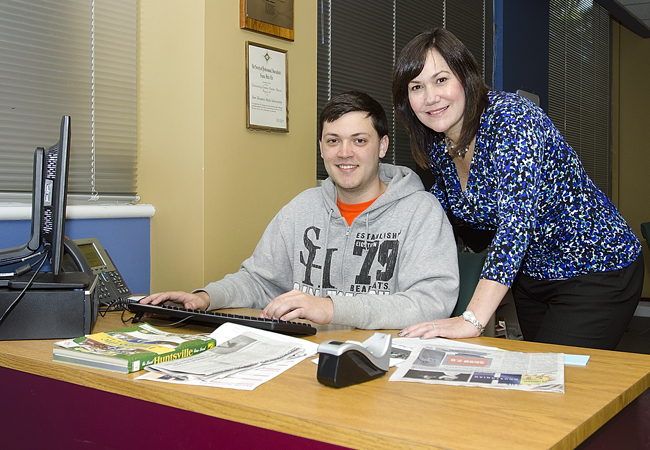Global Center for Journalism, Democracy To Take Its Mission Overseas In 2013
Dec. 21, 2012
SHSU Media Contact: Jennifer Gauntt
 |
| Senior Stephen Green will travel to Beirut, Lebanon, with Kelli Arena, executive director for the Global Center for Journalism and Democracy, to witness and report on the center's first conference beginning Jan. 16. The three-day event will train North African and Middle Eastern journalists to navigate the complexities of reporting on international courts and tribunals. It will be the first of many of its kind sponsored by the GCJD to train journalists abroad. —Photo by Brian Blalock |
During her time at CNN, Kelli Arena covered every major story over the past two decades, from the 1987 stock market crash to the terrorist hearings in Guantanamo Bay, Cuba.
But perhaps one of the most important stories she covered in her career at CNN was the Sept. 11 attacks, not only because of the profound impact the attacks had on the country but because of the impact the attacks had on her career.
“I had never covered terrorism—well, only very, very superficially—until 9/11 and then all the sudden I had to be all terror, all the time,” she said. “I wasn’t a terrorist expert before that, but then bam, my life changed.”
This phenomenon is common in the world of journalism. Anytime a journalist is assigned a new beat, they face a number of challenges in acclimating to that new field, whether it is finding sources or resources, or understanding agendas within the field.
These are the kinds of skills Arena hopes to teach journalists around the world as part of her new Global Center for Journalism and Democracy, housed in Sam Houston State University’s mass communication department.
The center, which opened this fall, was created as part of Arena’s ongoing efforts to educate journalists around the globe, including in countries where democracy is in its infancy, on what she considers a basic tenant of democracy: a free press.
“If you haven’t had a free press in the country that you grew up in, you don’t innately know what that looks like. You can’t rely on your own intuition to tell a story, to even know what it’s like to be objective,” said Arena, who also serves as the mass communication department’s Dan Rather Endowed Chair.
“I’ve done a lot of overseas training, not only of journalists but of political parties, youth activists and women. Every time I went into a different environment and people found out that I was a journalist, I was inevitably asked to do a separate training for journalists, because there is such a demand for people to learn how to do their jobs. This includes everyone from citizen journalists to people working for traditional media outlets.
“I am passionate about the role that journalism plays in a society: we educate, we inform, we hold officials accountable, we can influence society, we can influence leaders,” she said. “Journalists perform a public service every single day.”
Follow Stephen's reports from Beirut, beginning Jan. 16, on Facebook and on Twitter at @SHGlobalCenter. |
In January, Arena and several SHSU representatives will travel to Beirut, Lebanon, to host their first training focused on the issue of international justice.
Joining with the Samir Kassir Foundation, a free-press organization based in Beirut, SHSU’s GCJD will bring together regional journalists from North Africa and the Middle East and court and tribunal representatives to discuss the intricacies, and complexities, of covering these international events in an effort to “help close the information gap that can sometimes interfere with transparency.” There will also be intensive training for journalists to make them aware of the resources that exist to help them and practical advice from reporters who have first-hand experience to share.
“We have seen international tribunals and courts play a larger role in dealing with the many atrocities and criminal activities that we’ve seen around the world; Saddam Hussein went before an international court, for example,” Arena said. “It’s very important to understand the roles of those different courts and tribunals, to understand what types of issues fall under their jurisdiction.
Journalists will also learn how to tell stories in gripping and powerful ways; how to incorporate various media, from social to digital to mobile media; and basic ethics in recognizing and understanding propaganda and political agendas.
“Some of the (presenting) experts I know, some of them I know only by reputation,” Arena said. “Our main criterion was that we really wanted people that have ridden this horse before. If we’re bringing in journalists, we want journalists who have first-hand experience with covering international justice. If we’re bringing in experts, those are experts who have years of experience looking at international justice as a topic, who are truly experts. Because we’re only as good as the experts we present.”
Joining Arena will be faculty members from the College of Criminal Justice and the mass communication department. Senior political science and mass communication double major Stephen Green will also travel to Beirut to both witness and document the center’s first major international training event.
 “We thought this would be a great opportunity for the editor of our student newspaper to get first-hand experience covering an international story in the field,” Arena said. “His role will be two-fold: to, of course, benefit from the wisdom of the many journalists from around the globe that he’ll have access to during that three-day session, but also to be there as a working journalist to cover the conference, so that our supporters, alumni, student body, and community know what this center is up to, what we’re doing, and hopefully understand the impact of what we’re doing around the globe.”
“We thought this would be a great opportunity for the editor of our student newspaper to get first-hand experience covering an international story in the field,” Arena said. “His role will be two-fold: to, of course, benefit from the wisdom of the many journalists from around the globe that he’ll have access to during that three-day session, but also to be there as a working journalist to cover the conference, so that our supporters, alumni, student body, and community know what this center is up to, what we’re doing, and hopefully understand the impact of what we’re doing around the globe.”
Green said he is looking forward to the learning experience, and while there has been some recent conflict in the area, he said his only concern about the trip involves his fear of flying.
“I wanted to go on the trip to become a better journalist,” Green said. “It's not everyday that you're asked to go on a trip to another country and it be relevant to your major. I'll get to meet people and journalists from countries all over the world and get introduced to cultures I'm not regularly exposed to.
“College is all about growing as a person and expanding your ability in your chosen profession,” he said. “This trip is going to help accomplish both. I'll be able to network with not only the excellent faculty and staff going on the trip, but with the many journalists and experts that will be at the seminar.”
All of these things tie into what Arena considers the center’s three-pronged approach: serving SHSU students, training journalists, and helping governments and other entities that deal with the press understand why it is important to do so and how to do it effectively. But inherent in all of that is promoting a free press, she said.
“The press in America is a favorite whipping boy for many critics who don’t like the coverage, who think it’s slanted, but a free press is an essential part of a democracy,” Arena said. “I think that we take a free press for granted.
“Many people in the United States may not realize what journalists around the world face every single day. The rules that used to apply, when we were grouped in with people like medical personnel and others who were not targeted because they were not seen as part of the conflict, those rules have gone out the window,” she said. “Journalists now are very much targets, and there are many journalists who lose their lives every single year. It’s a dangerous business.
“A free press is something that shouldn't be taken for granted. I do hope that most Americans understand and appreciate the gift that it is.”
- END -
This page maintained by SHSU's Communications Office
Associate Director: Julia May
Manager: Jennifer Gauntt
Located in the 115 Administration Building
Telephone: 936.294.1836; Fax: 936.294.1834
Please send comments, corrections, news tips to Today@Sam.edu.

 SamWeb
SamWeb My Sam
My Sam E-mail
E-mail

